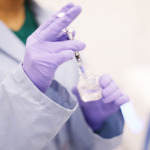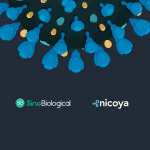

Presenters:
Michael Piazza, PhD, Director of Applications Development – Nicoya Lifesciences
David Siderovski, PhD, Professor, Pharmacology & Neuroscience – UNTHSC
In the pursuit of precision medicine for bipolar disorder (BD), identifying and functionally characterizing genetic mutations is crucial for refining therapeutic approaches. Dr. Siderovski’s lab recently published a study that exemplified such translational advances by evaluating the impact of a high-penetrance, familial BD-associated missense mutation, R59Q, within the PDZ domain of Regulator of G-protein Signaling 12 (RGS12). Utilizing the Nicoya Alto™ Digital Surface Plasmon Resonance™ (SPR) platform, this research rapidly assessed the mutation’s impact on RGS12 binding affinity to candidate peptide targets—CXCR2, MEK2, and SAPAP3. Results reveal a significant reduction in binding affinity across all tested peptides, suggesting altered protein-peptide interactions attributed to the R59Q mutation. This binding deficiency, corroborated by AlphaFold-derived structural models and molecular dynamics simulations, demonstrates how SPR-based functional testing can accelerate our understanding of disease-related mutations.
This approach bridges genetic discovery with functional validation, supporting the translational vision where mutation-specific insights drive personalized pharmacotherapy in psychiatric disorders. By integrating Nicoya’s SPR technology, we move closer to realizing precision treatments informed by unique genetic landscapes—a foundational goal for enhancing disease management and therapeutic outcomes in BD and other complex diseases.
What You Will Learn:


Presenters:
Michael Piazza, PhD, Director of Applications Development – Nicoya Lifesciences
Chris Heger, PhD, Director, Applications Science – Bio-Techne
Charge heterogeneity in monoclonal antibodies can negatively impact binding affinity and potency, so it is critical to ensure that individual charge variants of biotherapeutic molecules are thoroughly characterized to ensure product quality. Dr. Chris Heger (Bio-Techne) and Dr. Michael Piazza (Nicoya Lifesciences) will illustrate a fast, simple icIEF fractionation and digital SPR workflow that provides in-depth characterization of the charge variants of a therapeutic bispecific antibody (BsAb) Mosunetuzumab and a research-grade biosimilar. Using a combination of the MauriceFlex™ system and Alto™ Digital SPR, they demonstrate a novel method that utilizes imaged capillary isoelectric focusing (icIEF)-based charge separation and fractionation following by binding affinity analysis using surface plasmon resonance, offering a robust and efficient approach to evaluating charge variants. Prior LC-MS analysis of the fractions uncovered interesting differences between the two molecules. The speakers will show how the high-purity fractions of both the innovator drug and a research-grade biosimilar were analyzed by SPR for binding studies with their ligands CD3 and CD20, revealing notable differences in binding affinity, particularly between the biosimilar’s acidic peak and ligand CD20.
What You Will Learn:


Presenters:
Daryl Good, PhD, Sr. Staff Customer Success Scientist – Nicoya Lifesciences
Eliza Hanson, PhD, Postdoctoral Research Associate – Rowan University
Binding affinity measurements of nucleic acids and antibodies interacting with target proteins are important parts of the research processes involved in oncology, immunology, vaccine development, and other biomedical research areas. Developing reliable assays can be challenging, especially for researchers new to these techniques. This webinar will provide insights into efficient approaches for measuring biomolecular interactions using OpenSPR®, a label-free SPR platform known for its ease of use and cost-effectiveness.
Attendees will explore how OpenSPR has been successfully applied in a variety of life science research areas through peer-reviewed studies and real-world examples. We will offer practical tips for nucleic acid and antibody binding assays that can help researchers hit the ground running.
What You Will Learn:

Presenters:
Michael Piazza, PhD, Director of Applications Development – Nicoya Lifesciences
Anil Kumar, PhD, Head of CMC in Europe – ACROBiosystems
In collaboration with ACROBiosystems, Nicoya’s Alto digital surface plasmon resonance (SPR) system was utilized to characterize the binding kinetics of several transmembrane proteins in detergent, nanodisc, and virus‑like particle (VLP) formats. This webinar will showcase how the Alto digital SPR system provides high‑quality data on challenging membrane protein candidates while significantly reducing sample consumption and time to results.
Through this collaboration, researchers and pharmaceutical developers gain access to advanced technologies that enable the production, stabilization and precise characterization of challenging transmembrane protein interactions, accelerating the development of novel therapeutics and unlocking new frontiers in therapeutic targeting.
What You Will Learn:
Presenters:
Michael Piazza, PhD, Director of Applications Development – Nicoya Lifesciences
Victoria Goldenshtein, PhD, Postdoctoral Associate – Duke University
Digital SPR (dSPR) is a next-generation technology for characterizing biomolecular interactions. By combining digital microfluidics (DMF) with localized SPR (LSPR), digital SPR systems can effectively bypass common challenges found in traditional SPR and BLI platforms.
Understanding drug mechanisms in complex systems, particularly in the brain, remains challenging despite advancements at the molecular level Yet, cell-specific technologies like DART provide a promising solution, enabling targeted drug delivery to genetically defined neuronal cell types, thereby allowing the observation of the drug effects on brain dynamics and animal behavior. (Shields et al., bioRxiv, 2022, Shields et al., Science, 2017).
The underlying principle of DART technology is the covalent interaction between a protein and its target chemical molecule. In this webinar, we will discuss the optimization of the covalent capture affinity of DART, and the subsequent functional analysis of binding kinetics, using dSPR.
What You Will Learn:



Presenters:
Michael Piazza, PhD, Associate Director of Applications Development – Nicoya
Daryl Good, PhD, Senior Staff Customer Success Scientist – Nicoya
Livia Yuxiu, MSc, Product Manager – Nicoya
There is a growing need to streamline research workflows to get results faster and with greater throughput while minimizing effort at the bench, without compromising precision and accuracy. Equipped with user‑friendly interfaces that guide you from assay design to data analysis, our next gen SPR instruments Alto™ and OpenSPR® bring efficiency to biomolecular binding analysis.
Alto™ leverages digital microfluidics technology to automate high-throughput SPR analysis while enabling crude sample compatibility, ultra low sample volumes, and cloud-first software connection. OpenSPR® is an easy-to-use and cost effective platform with a proven track record, backed by over 300 peer-reviewed studies across research areas including immunology, oncology and infectious diseases.
Join us in a conversation with Daryl Good, Customer Success Manager, and Michael Piazza, Associate Director of Applications Development, as we delve into the applications of our Alto™ and OpenSPR® systems for streamlining biomolecular characterization, including affinity and kinetics analysis, epitope binning, library screening, and quantitation.
What You Will Learn:


Presenters:
Juliet Obi, Pharmaceutical Sciences – University of Maryland, Baltimore
Albert Serrano, Biomedical Sciences – University of Central Florida
Hniang Khamh, PhD, Field Applications Scientist – Nicoya
In this webinar, we’re excited to put the spotlight on rising investigators of disease-causing pathogens. Featuring two case studies from PhD Candidates Juliet Obi and Albert Serrano, you’ll learn about the biophysical, biochemical and computational approaches they are investigating to better understand molecular determinants of virulence and pathogen transmission.
What You Will Learn:

Presenters:
Scott Dessain, MD, PhD, Founder, CSO – OCMS Bio
Marko Jovic, PhD, Training and Development Manager – Nicoya
Viruses are known to be highly susceptible to mutations, often resulting in the emergence of variant strains. While some will disappear, others will persist and challenge our global healthcare system, just as we saw with the COVID-19 pandemic.
The pandemic is the most recent example of why rapid development of new detection strategies is more crucial than ever, especially when new variants demonstrate improved transmissibility or virulence. Co-presented by OCMS Bio and Nicoya Lifesciences, this webinar will present current strategies being applied in antibody discovery to accelerate the development of diagnostic tools for emerging viral variants.
Join us in a conversation with Scott Dessain (OCMS) and Marko Jovic (Nicoya), who will discuss the application of novel mAb screening technology and surface plasmon resonance (SPR) for rapid discovery and characterization of variant-specific antibodies, and will delve into the future of immunodiagnostics.
What You Will Learn:

Presenters:
Soleil Grisé, Sr. Product Manager – Nicoya
Adam Miles, Director, Product – Nicoya
Biospecific interactions play a major role in fundamental biological processes, and the advent of label-free detection tools has greatly enhanced our ability to characterize and better understand these biological systems. Yet, our ability to automate and scale our efforts has been limited by the need for a hands-on approach when it comes to understanding and optimizing the underlying biology.
What You Will Learn:

Presenters:
Michael Piazza, Ph.D, Systems Integration Manager – Nicoya
Sajni Shah, Product Marketing Associate – Nicoya
Are you spending a lot of time and resources trying to determine which biomolecular interaction technique is best-suited for your research? Are experimental time and technical complexities associated with interaction techniques major factors in your consideration?
To help you navigate the many biomolecular interaction techniques available, we’ve organized this webinar to dive into which technique is best-suited to your specific projects.
What You Will Learn:

Presenters:
Soleil Grisé, Sr. Product Manager – Nicoya
Michael Piazza, Ph.D, Systems Integration Manager – Nicoya
Rob Burgess, Ph.D, Chief Business Officer – Sino Biological
By January 2021, just over a year after the virus was first identified, there were over 100 million cases of COVID-19 reported worldwide and several viral variants in circulation. The unprecedented nature of the pandemic has magnified the need for accelerated scientific discoveries as researchers strive to bring novel therapeutics, vaccines and diagnostic solutions to market.
What You Will Learn:

Presenters:
Hannah Douglas, Sales Operations Rep. – Nicoya
Michael Born, Inside Sales Rep. – Nicoya
Alexandra Defazio, Sales Development Rep. – Nicoya
As a result of technological innovation and desire for improved efficiency, the world is becoming increasingly automated, there’s really no question about it and research labs are no exception. Heck, Alexa is more commonly known as a virtual assistant than a human name at this point.
Automation allows for a reduction in human error, and allows for fewer people to run more experiments efficiently. As of recently, with physical-distancing guidelines implemented as a response to the COVID-19 pandemic, reducing the number of people in the lab has become of utmost importance to keep research flowing smoothly.
What You Will Learn:

Presenters:
Aaron Sato, Ph.D, Chief Scientific Officer, Biopharma & VP, Protein Engineering – Twist Bioscience
Tonya Zeczycki, Ph.D, Assistant Professor – East Carolina University Brody School of Medicine
Matthew Gage, Ph.D, Associate Professor, Principal Investigator – University of Massachusetts Lowell
Thorsten Dieckmann, Ph.D, Associate Professor & Associate Chair, Graduate Studies and Research – University of Waterloo
Are you preparing to return to your lab, or are you in the middle of figuring out how to scale up your workflow? It is no question that researchers returning to the lab are facing challenges unlike ever before, as they navigate a new research landscape that continues being shaped by the COVID-19 pandemic.
Staying connected to your team, keeping up with new safety protocols, and managing uncertainty about your funding are just a few of the many challenges you are now having to overcome.
What You Will Learn:
"*" indicates required fields
"*" indicates required fields
Over 600 researchers worldwide are using OpenSPR™ to get the data reviewers are looking for. Read our brochure to learn more!
"*" indicates required fields
Interested in learning more about how Alto can accelerate your drug discovery? Fill out the form below to download a product brochure.
"*" indicates required fields